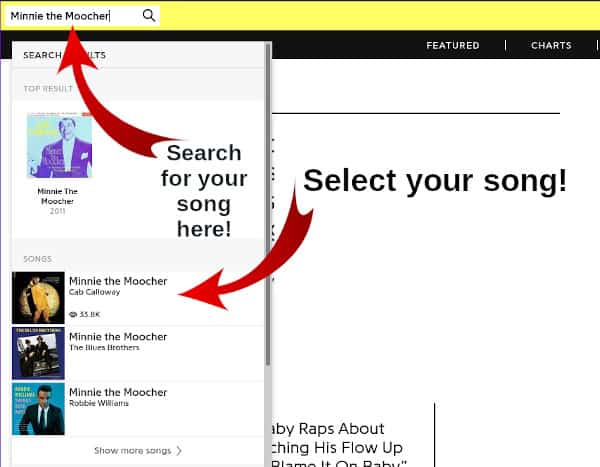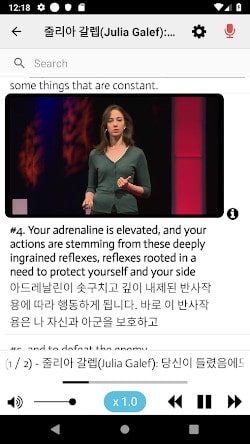The only way to become better at speaking English is to practice speaking English. For many, this may be difficult. You might find speaking English to be hard or perhaps even embarrassing. For a variety of reasons, you may not be confident in your English speaking abilities or perhaps you do not have easy access to a conversation partner.
Whatever your reasons, practicing your English speaking skills alone is entirely possible.
Use English resources like podcasts, movies, books, and even yourself to practice your English speaking skills. Sometimes, you are your best speaking partner. You are always interested in what you have to say and will always listen. Many places give you easy access to stuff you can use for speaking.
Shadowing
If you haven’t heard of shadowing, it is one of the most useful techniques you can use to practice English speaking and pronunciation alone.
Shadowing is when you follow along orally with something you are listening to. This could be anything: a podcast, music, the news, an audiobook, etc.
This technique allows you to imitate the way native speakers pronounce English words as well as the speed at which native speakers talk. Another plus of shadowing is that you can use any material to practice this technique. That means you can use your favourite materials and things you find most interesting to practice your speaking.
Sing-Along to Music
English music is incredibly popular throughout the entire world. Many people enjoy all types of music performed in English; you probably have a few favourite English recording artists too!
Music can be a powerful aide for helping you speak English better. If you sing along to English music, you will learn proper pronunciation and be able to speak English at a fast pace. Most music in English is sung at a fast tempo, so people who can sing along accurately get a lot of practice speaking English quickly too.
Another aspect of English music is that many of the lyrics aren’t formal English words. You won’t find boring, stuffy textbook language in English lyrics. You’ll be exposed to natural informal English pronunciation and plenty of English slang words too! Be sure you know when the song was produced or you might start using slang words that are out of fashion!
Genius Lyrics
It can be very useful to have a lyrics sheet when following along with some music. It can be difficult to understand what the singer is saying among all the noise from the instruments. Even native speakers have a hard time understanding musicians while they sing!
That’s why a lyrics website can help you find transcriptions of songs easily. My favourite lyrics website is called Genius.

I like Genius because it is easy to find lyrics for almost any song on it. You can also find explanations for some of the lyrics posted by members of the community. Often, English lyrics can be cryptic or hard to understand. Especially if they use a lot of slang or inside references. The explanations posted by members of the Genius community are simply stated and easy to understand.

If the song you search for has any lyric explanations, they will be shown in a light grey colour. To learn more about that lyric, click on it. It will turn yellow and you will see the explanation on the right side. Sometimes there will be more than one explanation. The community will vote on which they think is the best one.
You can use this as an English learner to understand your favourite songs better!
Online Resources
There are a wide variety of resources on the internet you can use to practice speaking English in the comfort of your own home. Here are some of the websites I recommend:
Famous People Lessons
Do you like celebrities? Many people do. The website Famous People Lessons by Sean Banville is a wonderful resource if you like celebrities too.
This website hosts articles on many famous people in the world. The best thing about this website is that every article has an audio recording to accompany it. This allows you to shadow very easily.
You can listen to the audio provided on the website and follow along using the article. The best part is that it’s all completely free.
Each article also has comprehension questions so you can easily check your understanding of the passage as well as any new vocabulary you might have learned.
Check out Famous People Lessons here.
TED Talks
TED talks are presentations given by a wide variety of people. Chances are you have seen a TED talk or two yourself. They are very famous around the world for their educational value. The topics of these talks range from scientific discussions to motivational speeches. You can find many different talks on their website.
A great thing about the TED talks website is that it is easy to search for any presentation topic you are interested in. The site offers a prominent and easy to use search bar that you can use to define your search based on several factors like topic, language, and duration.
Most of these talks also offer subtitles for you to use while watching the videos. This makes it easy to use for shadowing. Using TED talks to shadow can expose you to more complex English vocabulary in an easy to understand format. A presentation format means that the presenter is usually going to be speaking in a slower tempo and pronouncing their words very clearly. This is very useful to you as an English speaker and you should take advantage of the free content offered by TED.
Check out the TED talks website here!
TEDICT

A phenomenal companion application for TED talks is the TEDICT app. Using this app, you can consolidate all of the above into a single easy to use application.
TEDICT pulls the TED presentations off of the TED website along with the subtitles and presents them in the app’s video player. You can easily adjust the speed of the subtitles and video to make it easier to use for shadowing.
Another great feature of this app is that it includes a searchable dictionary linked with the Cambridge online dictionary. This makes it very easy to build a new vocabulary list within the app that you can reference while you’re watching TED presentations.
All of the functionality that makes the TED talk website great is included with this application. You can search by topic, language, and duration. The best of all is that the app is completely free.

Check out more information about TEDict on their website.
Podcasts
Podcasts are sources of some of the most rich English content you can find on the internet. There are thousands of different podcasts hosted about any topic you can imagine. If you have a hobby or interest, you can definitely find a podcast that caters to it.
These audio presentations range from specific topics like news and commentary about Linux to philosophy, or interesting conversations with experts and everything in between.
You can easily discover thousands of free podcasts and manage your subscriptions to them using a podcast app on your smartphone or tablet.
For Android Devices

The podcast app I recommend for android devices is Podcast Addict. This app is completely free and it can not only manage your podcast feed, but you can use it to discover new podcasts to listen to by searching.
For iOS Devices

The podcast that is most highly rated for iOS is Overcast. This is another free app that you can use to manage your podcast feed. You can search for new podcasts on Apple Podcasts.
How can this help my speaking?
You will have to be a little creative to find ways to use podcasts for speaking practice, but it can be done. One way you can do this is by summarizing the podcast after you listen to it.
You can describe the events of the podcast out loud to yourself. This is useful for multiple things. Of course, you can practice your speaking skills by doing this. At the same time, you are also exercising your skills at memorizing information and articulating your thoughts.
Read Aloud
Reading a passage out loud is a good way to practice your speaking skills while also practicing your reading. This is also a very easy and straightforward way to practice speaking English by yourself.
All that you need to do this is something to read. There are hundreds of millions of things written in English on the internet. Including physical books and other written media like newspapers and magazines, you should have no shortage of material to practice with.
While reading, you should also speak the words out loud. You can do this at your own pace without worrying about a conversation partner or keeping up with a recording like when you are shadowing. This is a very low effort way to practice your English speaking skills.
Record Yourself
You can get extra value out of this technique by recording yourself and listening to it afterward. I use this technique too when I am studying foreign languages.
This is a useful technique because it allows you to critique your own pronunciation and identify areas where you have trouble and need to focus your practice on. Usually, this is only possible if you have a conversation partner or a language tutor to help you but if you record yourself, you can do this by yourself.
An added benefit of this type of practice is that you think more deeply about English and its sounds. If you can successfully critique your own speaking weaknesses then you are properly identifying English sounds and working towards correcting your own pronunciation. I already wrote about the most effective way to learn about English sounds and properly pronounce them. You can read about that here.
Below you can listen to a recording of me reading a Japanese passage. This is an example of me using this technique in my own language studies. I can easily hear places where I make pronunciation mistakes or have a hard time saying a particular sentence.
This makes it easy for me to find and pinpoint my mistakes so I can focus on them in the future.
Talk to Yourself
This is a technique you can use offline too. You don’t need any extra materials or an internet connection to practice speaking alone. You can do this by simply talking to yourself.
You can do this anywhere. Although, if you’re easily embarrassed, maybe you don’t want to do it in public!
Narrate Your Day
One idea is to narrate your activities throughout the day. Whatever you happen to be doing, you can explain the process in English. This is a very useful practice for explaining and articulating everyday actions.
These types of common activities are ones we speak about often, so being able to practice speaking about these situations is very useful for you. Here’s an example of how you could use this technique:
“Right now, I am washing the dishes.”
“I am using an orange-scented soap and a sponge to clean plates, forks, spoons, and bowls.”
“I like to wash the dishes with very hot water. My girlfriend thinks the water I use is too hot, but it is okay for me.”
“Afterwards, I will do the laundry.”
You can fill up an otherwise boring time where you are doing household chores or other tasks that don’t require focused concentration to practice your English speaking skills.
Talk in a Mirror
You can use a mirror to practice your English speaking skills too.
If you feel self-conscious when you speak English, you can speak in front of a mirror to emulate a conversation with another person. Often, we feel just as much embarrassment and self-consciousness if we look at ourselves in the mirror when we speak as we do when we speak to another person.
You can use this feeling to become more comfortable with face to face conversations. However, this isn’t the only use for this technique.
Imagine you need to give a speech for your job or you need to make a presentation for a course you’re in. This can be very stressful, especially if you aren’t comfortable with public speaking.
The mirror technique is incredibly useful here too. You can speak in front of a mirror and observe your presentation yourself. This is a unique way to watch your own presentation in a way that is normally impossible. You can’t see yourself while you are presenting, but you can if you use a mirror.
So, you can observe areas in your presentation where you can improve your delivery.
Mirrors for Pronunciation
You can also use a mirror to improve your pronunciation.
While speaking into a mirror, you can see your face as you speak English. If you understand the mechanics behind properly pronouncing English words (that is, the position your lips and tongue should be in), you can use the mirror to check your mouth’s position as you speak.
This can be useful in identifying trouble areas for your pronunciation. There is a direct relationship between your mouth position and the kind of sound you will make, so you can easily track this relationship between sound and mouth position by observing yourself in the mirror.
Tongue Twisters
A tongue twister is a short phrase that is difficult to pronounce. These can be fun ways to practice your speaking by yourself.
There are many famous tongue twisters in English that you can use to not only practice speaking English but also your pronunciation.
Here is a list of tongue twisters (organized by sound) you can use to practice English with:
sh & s (/ʃ/ & /s/)
- She sells seashells by the seashore.
- I shot the city sheriff with the city sheriff’s gun.
- Sunshine city. (3 times fast)
- Shep Schwab shopped at Scott’s Schnapps Shop;
One shot of Scott’s Schnapps stopped Schwab’s watch.
- I slit a sheet, a sheet I slit.
Upon a slitted sheet, I sit.
p & b (/p/ & /b/)
- Peter piper picked a peck of pickled peppers.
A peck of pickled peppers Peter Piper picked.
If Peter Piper picked a peck of pickled peppers
Wheres the peck the pickled peppers Peter Piper picked?
- Betty Botter bought a bit of butter.
The butter Betty Botter bought was a bit bitter
And made her batter bitter.
But a bit of better butter makes better batter.
So Betty Botter bought a bit of better butter
Making Betty Botter’s bitter batter better.
- Pad kid poured curd pulled cod. (3 times fast)
- Rubber baby buggy bumpers. (3 times fast)
r & l (/r/ & /l/)
- red level, yellow lever (3 times fast)
- upper roller, lower roller (3 times fast)
- Little lily licked a lolly. (3 times fast)
f & w (/f/ & /w/)
- How much wood could a woodchuck chuck if a woodchuck could chuck wood?
- Fuzzy-Wuzzy was a bear. Fuzzy-Wuzzy had no hair. Fuzzy-Wuzzy wasn’t very fuzzy wuzzy, was he?
k/c & g (/k/ & /g/)
- green gremlins grin graciously.
- kind kids carefully craft candy for cute kittens.
- clean clams crammed in clean cans.
th & th (/θ/ & /ð/)
- thirty-three thieves thought they ought to thieve things.
- this thing, that thing, those things, these things.
- thirty-three thin Finns throw frogs into Thracian theaters.
Tongue twisters are a great way to practice English speaking because you can use them to pinpoint areas where you have trouble pronouncing certain English sounds.
If you practice with a certain tongue twister until you can pronounce it swiftly, you will eventually master that English sound and you will find it easier to pronounce in the future.
Transition to real conversations
Practicing speaking English alone is a great way to add additional English practice to your everyday life. You can increase your opportunities to practice your speaking skills when you also practice by yourself. However, you shouldn’t rely on it if your main reason for practicing speaking this way is a lack of confidence.
Language is a tool everyone uses every day to share their thoughts and feelings with others. We spend the majority of our days listening to and reading the words of others. The primary use of language is to communicate. Of course, you eventually want to use your English skills to communicate too.
So, at some point, you want to take the plunge and find yourself a conversation partner.
If you are looking for an English conversation partner, consider contacting me for a personalized 1 on 1 lessons. A private tutor is directly invested in your success and I strive to provide valuable advice to everyone I teach.
Conclusion
That’s all the tips I have for speaking English by yourself.
Hopefully, you picked up a couple of new strategies you can incorporate into your own English studies.
If you can increase the amount of time you spend speaking English, you will find your English speaking abilities will rapidly become better.
Happy Studying!



